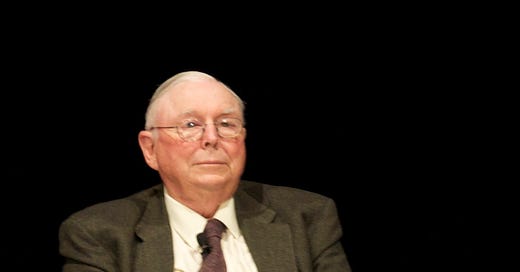Charlie Munger -- Part 2
How would Charlie Munger lead a football club to glory? We'll find out by turning this question around, asking: How would Charlie Munger lead a football club to get relegated?
If you missed it and want to catch up: Here’s part 1 about Charlie Munger’s principles, trying to answer the question: How would Charlie Munger lead a football club to glory?
The way I try to answer this question is by using one of his most famous mental models: inversion. Therefore, I try to answer the following two questions:
How would Charlie Munger lead a football club to get relegated?
What could he do to avoid relegation? What would be the opposite of (1)?
Blame others for mistakes
Another loss? It's all the players. A transfer didn't work out? It's all the scouts. Too many injuries? It's all the physios. Whatever happens, Charlie sees no reason to second-guess himself or the system he has built around his people. He always finds other people to blame and believes by simply replacing them, he can turn things around.
In Berkshire's annual report, Charlie and Warren often talk about their screw-ups and lessons learned. They take full responsibility for the mistakes and examine exactly why they failed. If a team would not perform well, Charlie would not start by blaming the players or coaches. He's very self-critical. He would first try to evaluate the system he build around them and see what mistakes he and his management team made. Also, he would encourage everyone to make mistakes and try new things for the sake of learning.
“I like people admitting they were completely stupid horses’ asses. I know I’ll perform better if I rub my nose in my mistakes. This is a wonderful trick to learn.”
Stick with your ideas: What worked today will work tomorrow
To avoid improvement, Charlie would always stick with his best-loved ideas, unwilling to give up any long-held belief. Because of that, he doesn't follow new developments and doesn't make any changes even when it became apparent that his ideas don't work anymore.
Charlie critically reviews his best ideas constantly to make sure he's thinking the right way. In any year, he doesn't toss out a new idea, he was probably not reading and thinking enough to evolve. You realize some metrics you thought were correlated with winning are in fact not? Throw it out. In with the new. According to Charlie, it just shows an evolution in our thought process, which means we are actually thinking and developing.
“Rapid destruction of your ideas when the time is right is one the most valuable qualities you can acquire. Any year that passes in which you don’t destroy one of your best loved ideas is a wasted year.”
Try to do everything yourself
Charlie talks a lot about the importance of a Circle of Competence. While we can acquire knowledge about most topics, we have to understand the boundaries of our knowledge and play within them. To achieve misery, Charlie would ignore these boundaries and try to do everything by himself. He would even to things where other people have an edge and ignore their advice -- whether it's about nutrition, injury prevention, or the academy.
Instead, Charlie would hire experts for every position and concentrate his duties on the most important decisions, allowing every employee to perform at their best. He would acquire enough knowledge to have good conversations about important topics -- and most importantly ask good questions -- but give every expert enough power and trust.
“Knowing what you don’t know is more useful than being brilliant. Acknowledging what you don’t know is the dawning of wisdom.”
Invest heavily even if leveraged
It's always a good idea to invest every penny that you have. There’s probably no better way to the abyss than going bankrupt. Why keep expenses low if you have just earned some money? If there's no more money available, it might be a good idea to take on leverage and continue investing heavily.
Charlie has been frugal for most of his life. Every dollar saved was a dollar that could be invested. This allows him to spend big on more important things — employees, players, tools, etc. However, he would only do that with what he calls a margin of safety — a cushion that even if the investment doesn't work out or if unforeseen expenses come up, he is prepared.
“Mozart is a good example of a life ruined by nuttiness. From the start, he was pretty miserable. He overspent his income his entire life – that will make you miserable.”
Be unreliable and untrustworthy
If you want misery, being unreliable, not faithfully doing what you are supposed to be is the way to go. Employees and players will distrust you soon enough which is a great foundation for relegation.
Charlie argues that good people tend to find other good people to walk down the aisle with, just as bad people tend to marry people equally negatively. Therefore, Charlie would try to create an organization that players are eager to come to — even with lower financial means. He would stick to his word, be reliable and make sure that the culture allows everyone to flourish, following the rule: To get what you want, deserve what you want. Trust, success, and admiration are earned.
"So doing what you have faithfully engaged to do should be an automatic part of your conduct. You want to avoid sloth and unreliability."


